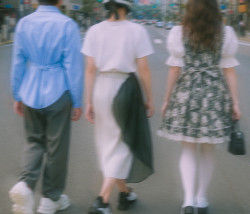
August 13, 2009
The Other Expatriates
Joseph Hincks learns the pleasures of exile from members of Tokyo's lesser-known foreign communities
By Metropolis

Photo by Benjamin Parks
Yoshi Akamine (30, Lima, Peru)
The last shouts of “Kampai” bounce around the dormant Harajuku backstreet below the terrace. “When you’re an artist, you express something from yourself, but being a designer you express what somebody else cannot,” explains Yoshi Akamine as she places her glass gently on the wooden railing. “I think of myself as an interpreter.”
After graduating from Lima’s Instituto Peruano de Publicidad in 1999 with a degree in graphic design, Yoshi found that her bicultural background opened doors that were shut to Peruvians of solely Indian descent.
“They didn’t even interview people, they were like, ‘You’re Akamine. Ah, you are Japanese ’cos of your father…’ And you get a job. For us, the third generation, it was all great.” When recession spread across South America in the ’80s, Peruvians who had family connections in Japan again enjoyed a distinct advantage—Akamine came here and made ten times more working in a factory than she could have in an office in Lima.
“I thought, ‘I just work hard and I come back to my country,’” she says. Yet Japan turned out to be more than just a paycheck. “This is the center, where everything moves… where you can find shops with people creating things, so you walk and you say, ‘Somebody else is making something,’ and your own brain begins to work.”
After three years spent at a hotchpotch of jobs, Yoshi had, by 2004, cultivated the means and contacts to set up as a freelance graphic designer for clubs around Roppongi.
“There were some weeks that you open the Tokyo Notice Board or Metropolis and there were, like, three or four ads of mine,” she says with evident joy. “It’s like having a lot of sons and daughters—it comes from you, and the first time you see your print published, it’s so nice. That’s what a career is—when you really choose something with love. When you see what you are capable of doing yourself, you feel proud.”
Despite her Japanese heritage, Yoshi still considers herself an outsider in Tokyo. “Foreigners don’t melt in,” she explains. “I think we can live together, but I don’t think [the Japanese] want us here. I’m not saying they want to kick us out; it’s just that they’re an island. I’m from the other side of the world. The things I love are not the things they love.”
Is she bothered, I want to know, by living in a place she can’t be entirely assimilated into?
“You asked me, ‘Do you feel comfortable in Japan, they don’t want you here?’ But this is where I have the opportunities,” she says. “Here I have this money, here I have the time. I know there are gentle people around… and they respect! I mean, how many horrible singers do you hear busking around the station? But somehow you look at them and they sing horribly and nobody says anything, and they’re happy! That’s what Japan gives us. Space to grow up.”







